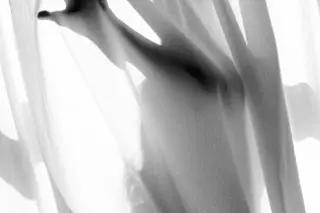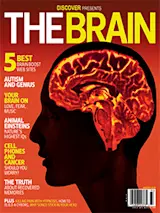You are lying naked on a metal table, your legs strapped into restraints. You can see luminescent alien beings with big, froglike eyes as they move about in the darkness. They begin to cut into your body, and you are afraid they might cut out your heart....
That description comes from a study of people who claim to be alien abductees, which was conducted at Harvard University and published in the journal Psychological Science. The transcript was distilled from a recorded interview with an “abductee” and was then played back to him while researchers measured signs of post-traumatic stress disorder. Listening to his own story triggered physiological responses as pronounced as those seen in combat veterans. Similar physiological responses were measured in nine other abductees in the study subjects.
The halls of Harvard nestled amid the 19th-century clapboard houses and cobbled streets of Cambridge, Massachusetts, seem an unlikely place to take extraterrestrials seriously. But the study was part of a six-year probe by Harvard psychologist Richard McNally and his colleagues into the minds of apparently sane people who believe they have memories of long-repressed events, including sexual abuse, alien abduction, and past lives. The study was an attempt to learn if humans can create memories unwittingly, memories so strong they may cause the debilitating symptoms of post-traumatic stress disorder.
McNally thinks people can and do make up powerful memories. These false memories can take on a life of their own with profound legal, political, and social consequences. If juries find plaintiffs’ recovered memories credible, people go to jail. About 15 years ago, a wave of cases involving recovered memories of sexual abuse tore families apart, led to lurid court trials, and spawned a branch of therapy devoted to recovered memories. While many of those accusations were later discredited, the idea persists that recovered memories are widespread and commonplace.
McNally’s research suggests that all memories—even false ones—are more than just accessories of experience. Memory is experience, he says, a neurohormonal event that cascades through the brain and, when accompanied by powerful emotions, is burned into synapses. And he wonders how and why the human brain does this.
There are no definitive answers yet, but there are powerful clues. With the help of neuroimaging techniques, researchers are finding that memory’s malleability is yoked to some of our most cherished aspects of intelligence: imagination, inference, and prediction. These are the same capacities that make us the earth’s dominant species. And because of this, it is likely that memory’s vulnerability to error is here to stay.
At the turn of the 20th century, Freud invoked the concept of repression, a protective mental mode that smothers distressing emotional events. Scientists have been sparring over the nature of memory ever since, and in the last few decades the fight has become so acrimonious that psychologist Kathy Pezdek, of Claremont Graduate University in California, likens it to a religious war. Elizabeth Loftus, a psychologist at the University of California at Irvine, whose studies of false memory made her the target of a lawsuit and a separate investigation by her former university, says her life was once “derailed” by her research. McNally echoes her: “I had to consult Harvard’s general counsel on three different occasions because of the saber rattling of trauma experts who didn’t like my work.” Susan Clancy, a psychologist at INCAE Business School in Nicaragua who trained under McNally when pursuing her doctorate at Harvard, says: “When I started this research, hate mail poured in by the ton. One colleague told me to get out of the area entirely since I’d be ruling myself out of job opportunities.”
The war over repressed memories is fueled by the lack of definitive evidence. Is it neurologically possible that life-shattering events can actually be buried for years, as Freud suggested, then winched out of the deep waters of the subconscious like a long-lost corpse? In a 2007 paper in the journal Psychological Medicine, a team of psychiatrists and literary scholars reported that they couldn’t find a single account of repressed memory, fictional or not, before 1800. The fact that repressed memory didn’t turn up even in fictional literature before this point suggests that it may be culture-bound, not the natural product of human consciousness.
Yet people who say they’ve experienced this phenomenon are tremendously convincing. Their sensory details are often striking and terrifying in their clarity. And these memories are intense enough to forever alter lives. “This experience [of abduction] really hits you in the pants,” says Will Bueche, an abductee who participated in McNally’s study. “All your assumptions about life are broken. It feels like everything you had based your character development on was wrong. You feel washed up on the shore with no personality at all.”
Such certainty was enough to convince another Harvard psychiatrist that the experiences, if not the abductions themselves, are real. The late John Mack, former head of the John E. Mack Institute, a few minutes’ walk from McNally’s office, spoke of the “ontological shock” he went through when he first listened to the stories of abductees. Mack is the author of Abduction: Human Encounters With Aliens and Passport to the Cosmos: Human Transformation and Alien Encounters. “That data operated like sulfuric acid on my worldview,” he says in a film documentary. “I couldn’t account for this in any way with anything I had learned.”
In 1999 McNally and Clancy, then a graduate student, published the first of a series of landmark studies that tried to account for such memories in a way that Mack could not. It has not been easy for psychologists to design respectable, ethical, replicable laboratory studies on recovered memory that their peers will accept. Critics shrug off most research with the comment that lab studies say nothing about repression of real-life trauma. Since the 1970s, for instance, Loftus has been able to implant false memories in individuals in lab studies—that they were lost in a mall as children or that they hugged Bugs Bunny at Disneyland (where there is no Bugs Bunny, because he’s not a Disney character). She has also shown that implanted memories can influence behavior. In one study, Loftus and her colleagues successfully led people to believe that they once got sick eating hard-boiled eggs or dill pickles.
Yet creating relatively innocuous memories in normal, healthy people may not relate to the experience of trauma victims. Pezdek found that people who are asked to imagine a plausible event may come to think it actually happened to them, but those asked to picture something implausible are not likely to make that mistake. In one of her studies, volunteers read descriptions of one real event and two false events—one plausible and one not—to a younger sibling or other close relative. The plausible false event described the relative’s being lost in a mall while shopping, and the less plausible description was of receiving an enema. In the study, subjects were much more likely to wrongly remember being lost than to wrongly remember an enema. The findings seem to undermine the idea that an unusual, traumatic event could be the product of a suggestion. “It’s easy to plant the memory of walking around a parking lot, being unable ?to find your car, because that happens to many people,” Pezdek says. “But planting a memory of something like sexual abuse is much harder.”
To probe this question, Clancy, McNally, and a Harvard colleague, psychologist Daniel Schacter, initiated a study of women who claimed to have recovered memories of sexual abuse. These women were at the white-hot center of the memory wars, and yet, Clancy says, “nobody was doing laboratory research on memory formation in this population. We wanted to know whether they were prone to creating false memories.” One of the team’s studies tested four groups of women: those who had been sexually abused and always remembered, those who believed they had been sexually abused but had no memory of it, those who had recovered memories of sexual abuse, and a control group who were certain they had never been abused. Each subject was given a standard word-retrieval test, in which she was presented with a list of semantically related words (such as rest, dream, nap, tired). Each was then presented with the list again, but this time it included a new word (such as sleep) that was similar in meaning to those on the original list.
Those with recovered memories of abuse recalled seeing the missing word on the first list 68 percent of the time, compared with only 38 percent for controls. The recovered-memory group scored significantly higher than any of the other three on false remembering. “There’s a heightened tendency for false-memory formation in those who can recall and visualize recovered memories,” McNally says.
Trauma therapists were outraged by the study. One of their objections: Perhaps the trauma had been so horrific it not only was banished from memory for years but also created memory defects that were now showing up in lab tests. So McNally and Clancy recruited individuals with recovered memories of alien abduction for the next study. Seven out of 11 of the abductees in their experiment had reported (under hypnosis) that aliens had extracted their sperm or eggs for breeding purposes. McNally and Clancy figured that nobody could argue that this group of subjects had post-traumatic stress disorder stemming from actual experiences that impaired their ability to remember events accurately in the lab. “We thought we’d found the perfect study group—people who clearly had created vivid, traumatic, false memories,” Clancy says.
The group produced significantly more false memories on the same word-retrieval test, just as the women with recovered memories of sexual abuse had. But that study also drew ire—from both abductees and the general population. “That totally shocked me,” Clancy says. “I got more hate mail, even from very educated people. I’d get letters asking me who I was to say these people hadn’t been abducted.” (Clancy’s 2005 book, Abducted: How People Come to Believe They Were Kidnapped by Aliens, discusses the studies of abductees in more detail.)
The results of another study with abductees were even more intriguing. McNally, Clancy, and others at Harvard studied physiological stress in 10 abductees and 12 controls. Individuals were interviewed about traumatic, neutral, and pleasant experiences. Thirty-second scripts were distilled from the interviews and then recorded by Scott Orr, who runs a psychophysiology lab at the Manchester VA Medical Center in New Hampshire. Abductees listened to the recordings while hooked up to electrodes that monitor perspiration, heart rate, and muscle tension. This approach has been used many times to measure post-traumatic stress disorder in war veterans. In the study, the abductees had a significantly heightened stress response. Even McNally was surprised. “Their reactivity was as great as real post-traumatic stress patients. These people genuinely believe these events happened, and it’s reflected in their physiology.”
McNally thinks that one reason abductees, who by all other measures are sane and healthy individuals, are more vulnerable to false memories is that “they score higher on measures of fantasy and absorption, which is the ability, for instance, to get lost in daydreams or be utterly entranced by a sunset. Their response to script-driven imagery about pleasurable moments in their lives is also higher than normal. So the upshot is, I think this stress response is a marker for intense emotional memories in people with vivid imaging capacities.”
Could our cherished capacity to imagine, which gives life and art richness, be a key to false memory?
People tend to view imagination as a purely mental activity, but it is strongly linked to vision. The work of Stephen Kosslyn, a Harvard psychologist, explains why.
Kosslyn began conducting neuroimaging studies of the brain (PET and fMRI) in 1990 and made a surprising discovery: Every area of the brain that is activated when we see is also activated when we create an image in our mind. “It was absolutely amazing,” he says. “Even the primary visual cortex, the first visual area of the brain that registers input from the eyes, is activated by imagery with the eyes closed. That suggests the opportunity for distortion is huge. The upside is, if imagery simulates what you actually see in the brain, you can use it for memory or reasoning or predicting. The downside is that you can become confused about the source of images. That’s kind of scary.”
One study of eight easily hypnotized individuals found that when they were simply asked to perceive a color, the color areas in the brain were activated—even if they were looking at a gray scale. The control group did not show this effect. (See “Hypnosis Works,” page 64.) Another study found that vivid visualization accompanied by emotion triggered more activation in visual processing systems than did images alone.
The human capacity for imagination is so great that sometimes people can create delayed post-traumatic stress disorder even in the absence of remembered traumas. Psychologist Richard Bryant of the University of New South Wales in Australia studied individuals who had been in such a serious accident that they had been knocked unconscious and had no memory of the event. A few of them later developed full-scale post-traumatic stress disorder. When Bryant interviewed them, he found they had reconstructed the accident by looking at news reports and photographs and by listening to the accounts of friends. In an act of pure imagination, they had cobbled together an accurate account so vividly pictured that it was powerful enough to produce PTSD.
Memory is yoked to cherished aspects of intelligence: imagination, inference, and prediction.
Laboratory studies suggest that the brain has a unique sensitivity to images. Psychologist Stephen Lindsay of the University of Victoria in British Columbia published a study in Psychological Science in 2004 that demonstrates how pictures enhance the formation of false memories. He read a narrative to 45 undergraduate students describing an event that had supposedly taken place in their first-grade class. The false story told how an individual and a friend got into trouble for putting Slime, a gooey substance, in their teacher’s desk. When Lindsay added a class photo from the first grade to the experimental setup, he found that two out of three students believed the false event happened. Lindsay was astonished at the high rate of false-memory reports. “The false memories were richly detailed,” he says. “One student commented, ‘No way! I remembered it! That is so weird!’?”
“We tell ourselves stories in order to live,” Joan Didion wrote in The White Album. Perhaps it’s not so baffling that what we can’t recall, we invent. Memory is designed to filter the world and discard what we deem irrelevant, says psychologist Marcia Johnson of Yale University. That we tend to home in on the details of an event is called weapon focus—we can recall with grisly clarity the gun that was pointed at us by a robber, but we may not remember his face or the other people in the store. If our brains were perfect video cameras, we would be paralyzed by information overload. In the short story “Funes, the Memorious,” Argentine writer Jorge Luis Borges imagines just such a savant and writes, “In the overly replete world of Funes there were nothing but details.”
Two years ago, behavioral neuroscientist James McGaugh, at the University of California at Irvine, published a paper in the journal Neurocase claiming to have found a real-life Funes, a woman whom he initially referred to by the pseudonym AJ but who later came to be known by her real name, Jill Price. “This woman came to me and said, ‘My memory is too good,’?” McGaugh says. “For her it’s like looking at a Rolodex and seeing all the names at the same time. It’s a flood of information, and it can make her life difficult.”
McGaugh spent five years subjecting Price, now in her forties, to psychological, neurological, and physiological tests. He even coined a new term for her condition, hyperthymestic syndrome, which means “overdeveloped memory.” Price has no special ability when it comes to memorizing words or numbers, but she has a remarkable capacity for remembering the events of her life. “I can give her any given day or date and she can tell me what she did on that day,” McGaugh says. “She also can recall any important public news events that occurred on that day.” Price’s newly published memoir, The Woman Who Can’t Forget, details what it is like to live with such a memory.
McGaugh has found three other patients with similar memories. A radio announcer named Brad Williams, 51, has an autobiographical memory that goes as far back as age 4. All four patients share compulsive tendencies, collecting or hoarding various objects, which McGaugh speculates may be related to their detailed memories of events. Many more may be out there: McGaugh is now systematically interrogating and testing a list of more than 200 people who say they have exceptional autobiographical memory.
Yet people never capture anything literally, says psychologist Henry L. Roediger III of Washington University in St. Louis. “Whenever you encode an experience, you filter it through your own awareness. If we only remembered the literal words of a conversation, we might miss the meaning. If I tell you I’m really tired today because the baby was up all night, you might remember that the baby cried all night. It’s an inference. We’re always doing that, and it’s actually very intelligent.” The odd thing, though, is that we usually don’t know we’re confabulating. People have unfounded confidence in their memories, says Elizabeth Loftus. She notes that in one study she worked on, three-quarters of the subjects reported having excellent memories. When college students were asked about the Challenger explosion years after it occurred, every single one remembered the space shuttle’s blowing up, but many got the details wrong. When the brain strives to re-create an event, Johnson says, it often grafts details of other memories onto it.
“The common wisdom was that once an experience was consolidated in long-term memory, it was stable,” says Yadin Dudai, who heads the department of neurobiology at the Weizmann Institute of Science in Israel. “Some of us now think that a memory may return to its embryonic state when it’s activated.” When a consolidated memory is reactivated through retrieval, it may become particularly susceptible to disruption. In the lab, experiments have not yet provided a clear answer. Joseph LeDoux, the Henry and Lucy Moses Professor of Science at New York University, was able to block the process of encoding a conditioned fear response in rats by injecting a drug, anisomycin, into their brains. The drug inhibits the synthesis of proteins and thus blocks the formation, or consolidation, of a memory. Twenty-four hours after the injection, the rats’ conditioned fear response seemed to have disappeared. Yet a study recently published in the Proceedings of the National Academy of Sciences found that the memory was only temporarily blocked. This time, University of Pennsylvania researchers conditioned rodents, treated them with anisomycin after acquisition and retrieval, and then examined them 21 days later. The rodents remembered the conditioned behavior.
To confuse the issue further, other published research finds that in rats conditioned to fear a shock to the foot, memory formation and subsequent recall, or reconsolidation, are actually separate processes, suggesting that established memories may be malleable and sensitive to disruption. Although both an original memory and its retrieval/reconsolidation may be blocked temporarily by anisomycin, University of Cambridge psychologist Barry Everitt and his colleagues found that the two processes depend on different chemicals within the hippocampus. The initial formation of long-term memory requires a chemical called brain-derived neurotrophic factor, while subsequent recall depends on a transcription factor called Zif268. The processes are related but fundamentally different—and so the researchers conclude that repeated remembering does not create a duplicate of the original memory.
Because memories are often interrelated rather than stored in isolation, a key question is whether reactivating one memory makes associated memories vulnerable to disruption. “It was thought that perhaps if you blocked emotional memory, you might eliminate all aspects of that memory,” LeDoux says. He created interlinked associative memories in rats and found that directly activated memories return to a more malleable state. Associated memories that are indirectly reactivated do not. This finding explains why the entire structure of a memory is not significantly altered each time the memory is retrieved and updated.
If we can isolate the chemicals involved in how memories are recalled, we may someday have new drugs to help treat phobias, post-traumatic stress disorder, and intrusive memories. In 2008 Rainer Reinscheid and other researchers at the University of California at Irvine, along with colleagues from the University of Muenster in Germany, took a step in that direction. They found that the protein neuropeptide S (NPS) dampens traumatic responses to bad memories in mice when administered to the amygdala, where negative memories are stored. When mice with blocked NPS receptors were exposed to situations that caused bad memories, their traumatic responses persisted longer. When the NPS receptors were activated, traumatic responses faded more quickly.
In real life, McNally says, memories do change. Yale University psychiatrist Steven Southwick surveyed Gulf War veterans first one month and then two years after experiencing traumatic events. About half the veterans who checked off events on the first survey failed to check off some of the same events after two years had passed. The timbre and quality of memories change over time too. Six months after a fatal shooting at a grammar school in suburban Chicago, McNally gave a questionnaire to school staff. The same questionnaire was given again 18 months afterward. “Each person remembered the event differently at 18 months than at 6 months,” says McNally. At the second interview, those who had more severe symptoms of post-traumatic stress disorder recalled their experience as more harrowing, while events were recalled as less harrowing by those who had recovered.
We create our memories even as they create us. It’s both dazzling and chilling to realize that the narrative arc of our lives relies on a phenomenon that is by turns robust, fallible, malleable, potent, slippery, inventive, and, above all, powerfully yoked to emotion.
If we are storytellers, even inaccurate ones, how does that serve us? “What has been missing from all the theories of false memory,” Clancy says, “is the desire for meaning. I think psychologists are tone-deaf to this. It’s a very important ideological factor in the development of any belief. Alien abductees talk about the fact that they don’t feel alone in the universe any longer.” When McNally and Clancy asked abductees if they were glad they’d had these experiences, “we only had one person say no. Everyone else said it was initially disorienting and frightening but that they eventually put it all in a spiritual perspective.”
So how and why would an individual develop a story line as unusual as an alien abduction? Are there any common ingredients? Part of the answer may derive from a physiologically dramatic and terrifying phenomenon called sleep paralysis. In classic sleep paralysis, a person wakes early from a dream and is unable to move (as is standard during REM sleep). In many of these cases, people also generate vivid dream images called hypnopompic hallucinations. Many alien abductees experience sleep paralysis, and if they don’t understand the phenomenon and believe their otherworldly hallucinations are real, McNally says, they may seek out therapy, hypnosis, or bodywork, thereby “recovering” additional memories. “These folks are very open to what we might call New Age beliefs, such as reincarnation, energy therapies, astrology, and telepathy.”
Bueche sees it this way: “I won’t call abduction a spiritual experience, but by its very nature it casts you into reflection about your existence.... You feel you’re behind the scenes of a theater, of an incredible play...this play we’re all in.”
He might as well be talking about the phenomenon of memory itself—in which we somehow weave and unweave ourselves by our own hand.















